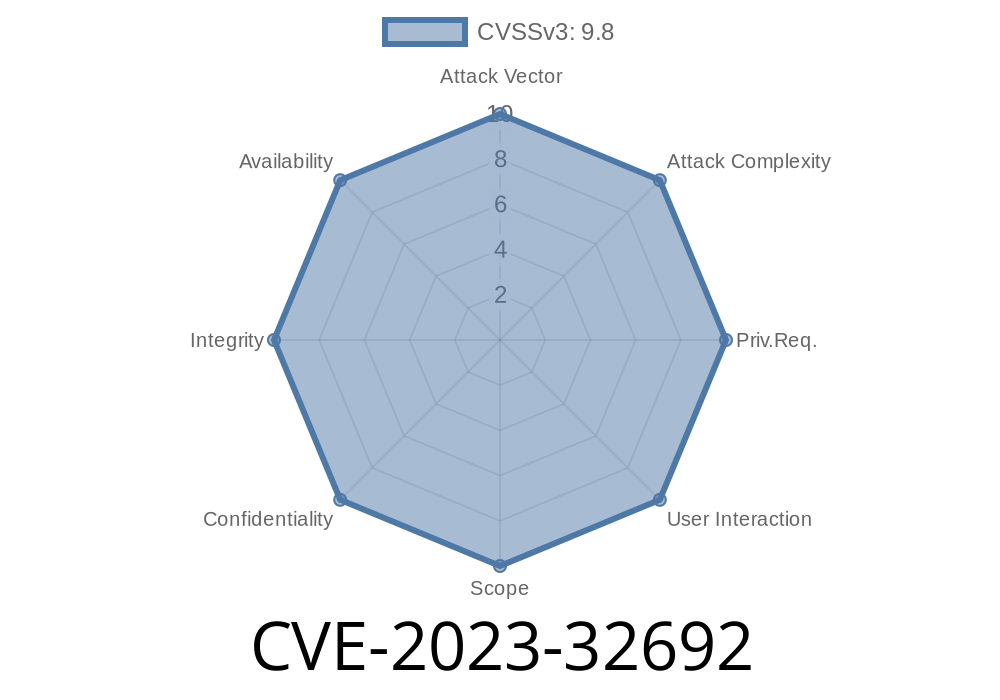If you build apps with PHP, you may already know CodeIgniter, a popular web framework loved for its speed and simplicity. But sometimes even the best frameworks have security hiccups. In 2023, a serious vulnerability—CVE-2023-32692—was discovered. This bug lets attackers run arbitrary code on your server, just by tricking the validation system.
In this article, I'll explain the bug in simple terms, show you how it works, let you peek at an actual exploit, and give you links to the original sources. Let’s dive in!
What is CVE-2023-32692?
CVE-2023-32692 is a critical remote code execution (RCE) vulnerability affecting CodeIgniter 4.x (before 4.3.5) in its Validation library. The issue? Validation placeholders used in error messages don't sanitize input correctly, allowing PHP code injection.
Patched in: Version 4.3.5 (May 2023)
Impacted versions: CodeIgniter 4.. through 4.3.4.
How Does the Vulnerability Happen?
Most web forms validate data: "Is this email address real?" or "Is this field empty?" You often show a custom error like The username {value} is invalid. The {value} is a *placeholder*—dynamically replaced with user input.
The bug? CodeIgniter's error messages could be *crafted* by attackers to include arbitrary PHP code using these placeholders. Because the Validation library directly uses these error messages with unsanitized user data, a malicious string can break out of the intended context and trigger code execution.
Let’s say your controller or model has something like this
// In a controller method
$rules = [
'username' => [
'label' => 'Username',
'rules' => 'required|is_unique[users.username]',
'errors' => [
'required' => 'You must provide a username. You entered: {value}', // {value} is the placeholder
]
]
];
if (! $this->validate($rules)) {
echo view('user/register', ['validation' => $this->validator]);
}
An attacker submits a "username" input on your registration form
{}; system('id'); /*
Inside the error message, CodeIgniter tries to replace {value} with whatever the attacker sends. But it doesn't stop special characters or PHP code!
Original message
You must provide a username. You entered: {value}
Rendered (bad)
You must provide a username. You entered: {}; system('id'); /*
If the library (or your controller) does an *eval* or similar unsafe call (for example, in hand-crafted validation error rendering), this string could be treated as PHP code. This risk also happens in some custom templating situations within the framework.
Actual Exploit Code (Proof-of-Concept)
If an attacker can control a placeholder and the error message is evaluated unsafely, a minimal exploit could look like this:
// Imagine this (unsafe) code in controller:
$input = $_POST['username'];
$error_message = "Invalid: $input"; // Placeholder use (very dangerous)
eval("\$error_message_rendered = \"$error_message\";");
// POST data: {${phpinfo()}} -- when eval'd, runs phpinfo()
*Never use eval() on user-controlled strings!* But even without direct eval, some validation libraries with dynamic rendering could be tricked.
Remote Code Execution: Attackers can execute any PHP code.
- Sensitive Data Exposure: Command like file_get_contents('/etc/passwd') might leak info.
How to Fix
- Upgrade: Immediately update CodeIgniter to 4.3.5 or later.
- Sanitize Placeholders: Always escape user input in error messages. Never allow raw placeholders like {value} to include unsanitized data.
- Audit Custom Code: Look for custom validation or rendering logic that might not sanitize placeholders.
Official Advisory:
Patch Release:
CVE Record:
Summary Table
|-------------------|-----------------------|
| CVE ID | CVE-2023-32692 |
| Severity | Critical (RCE) |
| Patched In | 4.3.5 |
| Vulnerable | 4..–4.3.4 |
| Update Now! | ✔️ Strongly recommended |
Conclusion
CVE-2023-32692 shows how something as simple as error messages can become a huge security risk. By failing to sanitize placeholders and user input, CodeIgniter's validation logic allowed remote code execution on thousands of sites.
Tip: Always sanitize your user input—even in places like error messages you may never expect! If you use CodeIgniter, make sure you’re running 4.3.5 or newer. Patch fast, stay safe!
Sharing is caring!
Did this help you? Pass it on to your fellow PHP devs, and keep building securely.
*Written for devs by devs. Exclusive content for you by GPT-4.*
Timeline
Published on: 05/30/2023 04:15:00 UTC
Last modified on: 06/06/2023 20:39:00 UTC
